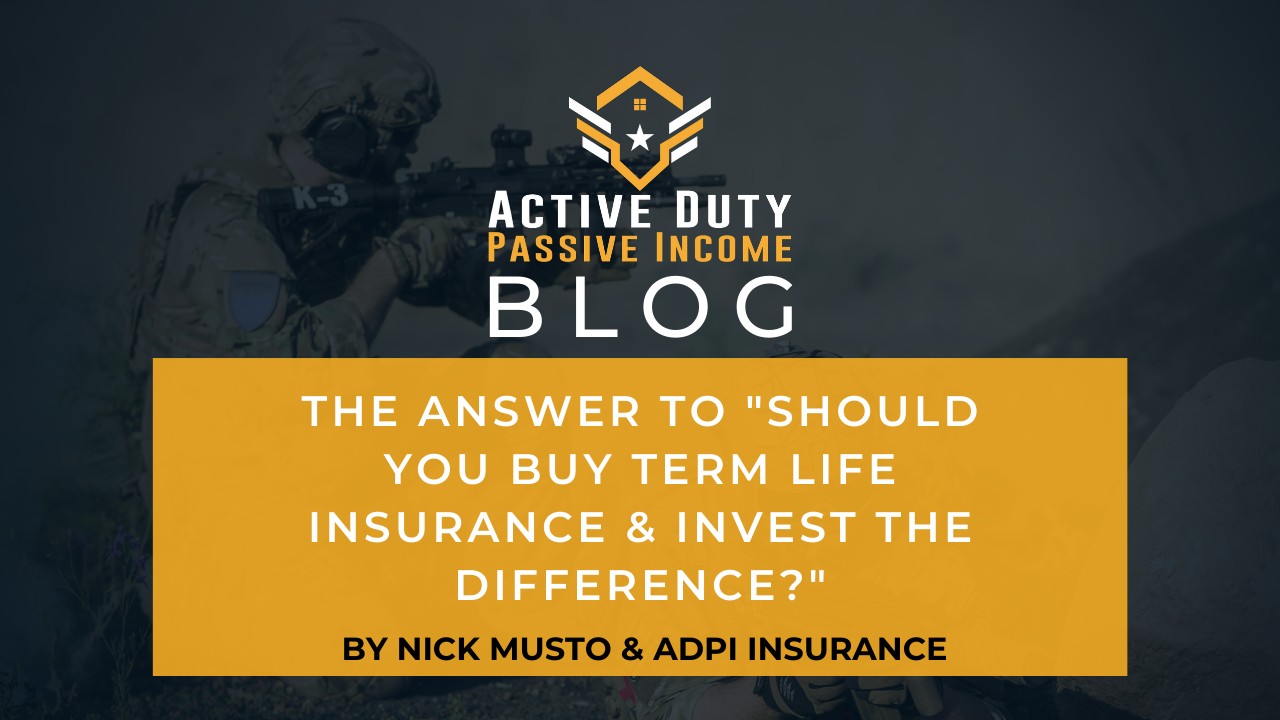Should You Buy Term Life Insurance & Invest the Difference?
If you’ve done even a little research on the pros and cons of Term Life Insurance and Whole Life insurance, you’ve almost certainly come across the phrase “Buy term, invest the difference.” The basic premise is that term insurance is cheap, whole life insurance is expensive, and if you buy term and invest the difference, you’ll be better off. Simple, right?
Not necessarily. Let’s unpack this a bit.
Term Life Insurance
Is term insurance cheaper when compared to whole life insurance? In a strict dollar-for-dollar sense, the answer is a clear yes. But, the question the savvy investor should ask is, “Why?” Are insurance companies offering you cheap term life insurance out of the goodness of their hearts? I think we can agree the answer to that is no. Here’s the reason term life insurance doesn’t cost the average, healthy, military age individual much money: somewhere along the lines of 99% of term policies will never payout.
 Why is this the case? Most term policies become prohibitively expensive as you get older, and typically cease covering you at age 65. Of course, a term policy not paying out is an overall plus for policyholders–seeing as the payout only occurs upon their untimely demise. But the point I’m making is this: term policies appear cheap, but the real reason they are inexpensive is what you are purchasing is protection against unexpected death at a statistically young age. Think of it as an (admittedly morbid) lottery ticket.
Why is this the case? Most term policies become prohibitively expensive as you get older, and typically cease covering you at age 65. Of course, a term policy not paying out is an overall plus for policyholders–seeing as the payout only occurs upon their untimely demise. But the point I’m making is this: term policies appear cheap, but the real reason they are inexpensive is what you are purchasing is protection against unexpected death at a statistically young age. Think of it as an (admittedly morbid) lottery ticket.
None of this is necessarily a bad thing! If you’re in the military, you should have the maximum $400,000 coverage the SGLI provides and depending on your situation–more term coverage can make sense. For a relatively low cost, term life insurance can protect your family against the loss of your current and future income should the worst happen.
That said, term life insurance has none of the additional benefits of cash value whole life insurance we have outlined in other posts. Any premiums you pay will probably never provide you any financial benefit outside peace of mind when the coverage is in force. Luckily, the techniques that allow us to structure whole life policies to build cash value quickly often include additional term insurance within your policy at the ages you need it most. You get the best of both worlds!
Whole Life Insurance
Why are Whole Life premiums higher than those of term policies? As the name implies, these policies cover you for your whole life. That means your beneficiaries are guaranteed to receive a tax-free death benefit in the (hopefully distant) future. Do you pay more for a policy? Of course! When you pay your whole life insurance policy premiums, you are over-funding your policy in its early stages to allow for long-term growth. The insurance company invests that money and plans on the fact that, on average, they will be able to earn more money on their assets than they need to pay out in claims. You see that growth in your cash value as well, allowing you to enjoy the many unique features of this tax-advantaged insurance product has to offer.
You can read more about the benefits of whole life insurance here.
Lastly, let’s talk about “investing the difference.” When critics attack whole life policies, they compare apple to oranges and point out that you can achieve higher returns in the stock market. That may be the case, but the reason this possibility exists is that the returns are generally strongly related to risk. When you have money in the markets, you bear all of that risk on your own. A whole life policy transfers some of your overall financial risk to the insurance company. In return, you receive guaranteed cash value growth throughout your entire life.
Perhaps more importantly, critics also seem to be implying that investing and owning a whole life policy are mutually exclusive. That is not the case! If you’re reading this post, I’m willing to bet you’re an investor and you’re ready to take risks. But I’m equally sure that you know there’s value in holding some of your wealth in lower-risk assets. The guaranteed growth properly structured whole life policies provide is far superior to other low-risk assets such as savings accounts, CDs, or government bonds. These returns are better without even factoring in your ability to leverage your cash value to boost your investments! This investment potential is one of the main reasons ADPI is so excited about these policies about Term Life Insurance.







